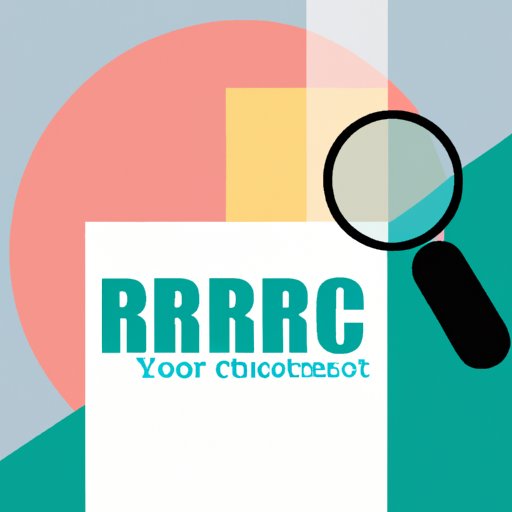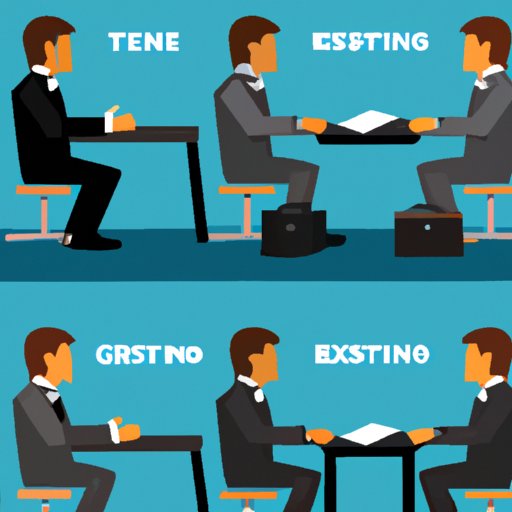Introduction
An interview is often the last step in the job application process and can be a nerve-wracking experience. However, if you are prepared for the interview and know what to expect, it can be a much less stressful experience. In this article, we will discuss the importance of interview preparation and provide a comprehensive guide on how to be prepared for an interview.

Research the Company and the Position You Are Applying For
It is important to do some research before the interview so that you have a good understanding of the company and the position you are applying for. According to a survey conducted by CareerBuilder, 75% of employers are more likely to hire someone who has done their research about the company. Furthermore, 87% of employers said that a candidate’s knowledge of the company was somewhat or very important during the interview process.
Steps to Take Before the Interview
The first step is to research the company’s website and social media accounts. This will give you an overview of the company’s mission, values, products/services, and current news. It is also helpful to read any press releases or articles written about the company. Additionally, look up reviews of the company on sites such as Glassdoor and Indeed. This will give you an idea of what it is like to work for the company.
Next, research the position you are applying for. Read through the job description carefully and make sure you understand all of the duties and responsibilities required. If possible, reach out to someone who currently holds the position to get a better understanding of what the role entails. This will help you prepare for questions related to the position.
Common Questions to Ask
When researching the company and the position, it is helpful to come up with a list of questions to ask during the interview. This shows that you have done your research and makes a good impression on the interviewer. Some common questions include: What are the main challenges facing the team right now? What is the team structure? What do you enjoy most about working at the company? What career development opportunities are available?

Prepare Answers to Common Interview Questions
It is essential to prepare answers to common interview questions prior to the interview. This will help you feel more confident and reduce the chances of getting caught off guard. Here are some tips for answering questions:
Types of Questions to Expect
Common types of questions you may be asked include questions about your experience and qualifications, why you want the job, what sets you apart from other candidates, and how you handle difficult situations. You may also be asked questions about the company and the position, so it is important to be familiar with the information you researched earlier.
Tips for Answering Questions
When answering questions, it is important to stay focused and answer clearly and concisely. Make sure to provide specific examples to back up your answers. Additionally, try to avoid making negative comments about previous employers or colleagues. Focus on the positive and emphasize the skills and experiences that make you a great fit for the job.
Practice Interviewing with a Friend or Family Member
Practicing interviewing with a friend or family member can help you become more comfortable with the process and boost your confidence. Research conducted by Harvard Business Review found that practicing for an interview can significantly improve performance and increase the likelihood of getting hired.
Benefits of Practicing
Practicing for an interview can help you become more familiar with common questions and enable you to think of better answers. Additionally, it can help you identify areas where you need to improve. When practicing, make sure to pay attention to body language, such as maintaining eye contact and sitting up straight.
How to Make the Most of Your Practice
When practicing, try to simulate the actual interview as much as possible. Have your friend or family member act as the interviewer and ask them to give you feedback on your answers. Additionally, practice answering questions out loud rather than just thinking about them. This will help you become more comfortable speaking in front of an audience.

Dress Professionally for the Interview
Your appearance is an important factor in the interview process, so it is important to dress professionally. According to a survey conducted by The Balance Careers, 69% of employers said that a candidate’s dress was somewhat or very important during the interview process.
Examples of Professional Attire
For men, professional attire typically includes a suit, dress shirt, tie, and dress shoes. For women, professional attire typically includes a blouse, skirt or dress pants, and dress shoes. It is best to avoid wearing overly casual clothing, such as jeans and t-shirts.
What Not to Wear
Additionally, it is important to avoid wearing anything too revealing, such as low-cut tops or short skirts. It is also important to avoid wearing too much jewelry or perfume. Finally, make sure your hair is neat and tidy and avoid wearing excessive makeup.
Bring a Copy of Your Resume and References
It is important to bring copies of your resume and references to the interview. This will show the interviewer that you are organized and prepared. Additionally, having these documents on hand will allow you to reference them during the interview.
Why It’s Important to Bring These Items
Having a copy of your resume will allow you to easily reference your past experiences and qualifications. Additionally, bringing a list of references will show the interviewer that you have people willing to vouch for you. Make sure to bring at least three references and include their name, title, phone number, and email address.
How to Present Them During the Interview
When presenting your resume and references, make sure to hand them to the interviewer at the beginning of the interview. Additionally, make sure to mention any relevant experience or qualifications listed on your resume during the interview. This will make it easier for the interviewer to remember you.

Make Sure You Have an Idea of What Salary You Are Looking For
Before going into the interview, it is important to have an idea of what salary you are expecting. This will ensure that you are not taken advantage of and that you are getting paid a fair wage for the job.
Considerations When Deciding on a Salary
When deciding on a salary, consider the industry standards for similar positions. Additionally, consider your experience level, education, and location. It is also important to keep in mind that the salary offered may be negotiable.
Strategies for Negotiating Salary
When negotiating salary, it is important to be polite and professional. Provide an explanation of why you are worth the amount you are asking for. Additionally, offer to provide evidence, such as past performance reviews or awards, to support your request. Finally, be willing to compromise and be open to counteroffers.
Be Prepared to Ask Questions About the Company
At the end of the interview, the interviewer may ask if you have any questions. It is important to have some questions prepared so that you can show that you are interested in the job and the company. Here are some questions you may want to consider asking:
Questions to Ask During the Interview
What does a typical day in this position look like? How would you describe the company culture? What are the biggest challenges facing the team right now? What type of training and development opportunities are available?
Reasons for Asking Questions
Asking questions is a great way to demonstrate your interest in the job and the company. Additionally, it will give you an opportunity to learn more about the position, the team, and the company culture. Asking questions can also help you decide whether or not the job is a good fit for you.
Conclusion
Interview preparation is essential for making a good impression and increasing your chances of getting hired. To be prepared for an interview, you should research the company and the position, prepare answers to common questions, practice interviewing with a friend or family member, dress professionally, bring a copy of your resume and references, and have an idea of what salary you are looking for. Following these steps will help you feel more confident and make a great impression on the interviewer.
(Note: Is this article not meeting your expectations? Do you have knowledge or insights to share? Unlock new opportunities and expand your reach by joining our authors team. Click Registration to join us and share your expertise with our readers.)
